If there is any good to come from last weekend’s Christian-nationalist “Jericho March,” and other bizarre, angry, and sometimes-violent right-wing attacks on the 2020 presidential election, it’s that the scales may start to fall from the eyes of thoughtful American Evangelicals. We will see the truth, and we’ll learn that the story we tell ourselves about our own alienation from American culture is fundamentally wrong in many material respects.
In short, contrary to popular conservative Christian belief, Evangelicals are not just facing resistance for their righteousness: They are also reaping what they’ve sown with their own commitment to partisan politics and to sometimes unjust and even malicious policies that have no grounding in biblical ethics.
There is no question that many millions of theologically conservative Christians feel like they’re increasingly under cultural siege, loathed and despised by the broader secular culture. The anger raises a critical question: Why?
Here’s the common Christian answer, the one that’s conventional wisdom in most conservative churches: “Just as Jesus and the apostles promised, the world hates us because of our faith. We reject the world’s libertine sexual ethics and commitment to abortion, and thus the world rejects us.”
There is truth in this statement. I’ve seen it with my own eyes, time and again. During a two-decade litigation career, I represented Christian groups tossed off campuses for their defense of traditional biblical sexual ethics. I represented Christian students and groups at schools from coast to coast who faced censorship for advancing pro-life views. I advised Christian institutions who faced threats to their existence and independence for requiring that employees and/or students believe and uphold orthodox statements of faith.
I can tell story after story of astonishing intolerance and even outright hatred displayed against good and faithful men and women who merely sought the right to speak, the right to meet, to sing, and to pray. Elements of the illiberal left have been and still are threatening and cruel to even the best Christian folks. No amount of winsomeness or kindness or civility could save those Christians from relentless attacks.
These cases were both alarming and comforting for conservative Christians. They were alarming for obvious reasons. No one wants to face threats to their liberty and livelihoods because of the free exercise of their faith. Yet the attacks were comforting because these are exactly the kinds of secular attacks Christians are taught to expect. After all, in John 15, Jesus told his disciples: “If the world hates you, know that it has hated me before it hated you. If you were of the world, the world would love you as its own; but because you are not of the world, but I chose you out of the world, therefore the world hates you.”
But there’s also a less comforting—and also quite true—answer to the question, “Why do they hate us?” There is a growing cultural divide between white Evangelical America and much of the rest of the nation that has nothing to do with Christian faithfulness.
No, I’m not talking primarily about Donald Trump. Support for the president is a symptom, not the disease. Instead, I’m talking about race, immigration, history, and the vast and growing gulf between white Evangelicals and the rest of the United States on issues that dominate so many American hearts.
Last month, the University of Virginia’s Institute for Advanced Studies in Culture published a report called Democracy in Dark Times that was designed to take a deeper look at the different beliefs and motivations of red and blue America. Its findings regarding white Evangelicals were startling. Evangelicals, it said, were emerging as the “cultural other”:
The cultural other is an individual or, more than likely, an entire group, whose beliefs and practices place them outside of “normal” or “acceptable” society. Their way of thinking and of life offends the sensibilities and ideals of the dominant group, and in this sense, they are stigmatized in the extreme. As such, the cultural other is regarded as not just outside of the in-group, but so far outside that their very presence represents a profound ethical violation that might even be experienced as repugnant to those who are not part of it. This would now seem to be how many people outside of Evangelicalism have come to think about the modern-day Evangelical movement and those who comprise it.
The authors—James Davison Hunter, Carl Desportes Bowman, and Kyle Puetz—recognize that theological and philosophical differences explain part of the divide, but so does politics:
On theological and philosophical grounds alone, Evangelicalism today finds itself outside of the mainstream of the contemporary world. But the more political power the Evangelical movement has sought to wield, and the more the Evangelical movement has aligned itself with the politics and practices of the political Right, the more its reputation has been diminished.
So far, many conservative Evangelicals would nod along. “Tell us something we don’t know,” they’d say. “We’re remaining biblically faithful in an increasingly unfaithful world. Of course secular America won’t like us.”
But wait. What does the data say regarding America’s widest gaps? Where is the gap between white Evangelicals and the rest of America particularly acute? On matters of race:
The widest divisions in America are, in fact, between White Evangelicals and the African American community as a whole. It is a racial chasm, to be sure, but one intensified and deepened by the particular character of conservative White Evangelicalism—a chasm not mirrored between Black Evangelicals and non-Evangelicals. This division is seen most sharply on those issues that specifically bear on African Americans and Hispanics as well.
The numbers are just immense. Moreover, concerns about racism are no mere side issue, in the survey, they represented the top political concern of progressive partisans.
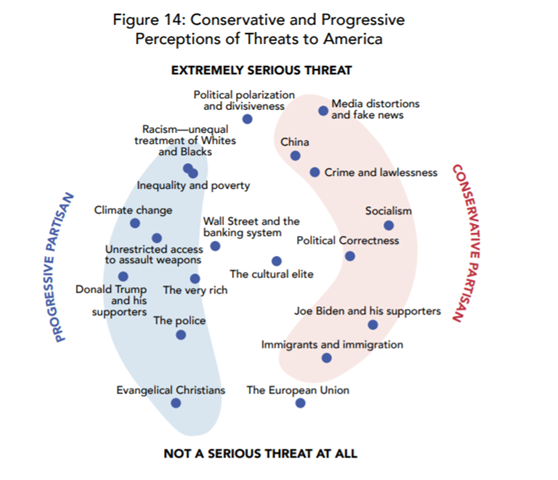
When you drill down into the numbers, the gaps can sometimes be astonishing. For example:
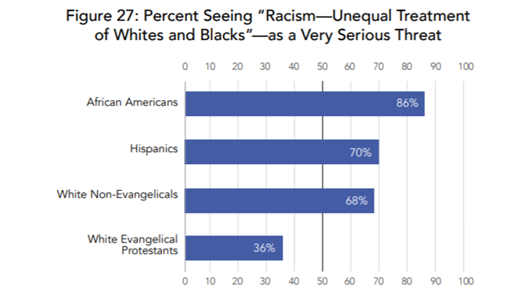
Here’s another example:
Almost universally, Blacks (91%) believe that “the police and law enforcement unfairly target racial and ethnic minorities.” (This figure is up from 83 percent in 2016.) The majority of Hispanics (60%) and White non-Evangelicals (57%) today share this opinion. By contrast, the percentage of Blacks who hold this view is more than five times the percentage of White Evangelicals (17%); 83 percent of the latter disagree, with 41 percent disagreeing strongly.
And another:
There is the question of what to do about the legacy of slavery and of racism in America. One proposal that has been debated for a number of years is the idea of reparations—some kind of “financial compensation to African Americans for their historic mistreatment by White Americans.” The racial divide over this issue is staggering. Nearly eight of 10 African Americans (78%) are in favor of reparations, compared to 41 percent of all Hispanics and 34 percent of all non-Evangelical Whites. White Evangelicals as a group, however, stand far outside of this consensus, with only 7 percent in favor of this idea.
And another:
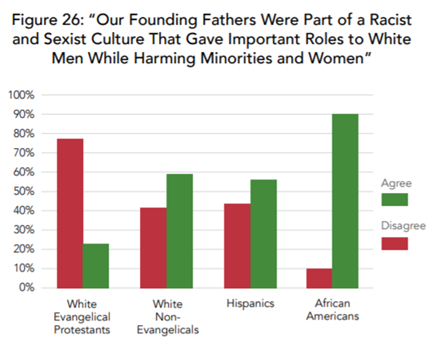
But wait. You might object that it’s unfair to compare White Evangelicals with populations of people who don’t share their theological beliefs. After all, if theology is relevant to policy, then perhaps we should compare groups who share the same theology but not the same race—white Evangelicals and non-white Evangelicals. Do white and non-white Evangelicals see the world the same way? Here’s what the study concluded:
A community of religiously committed Evangelicals holds a common faith that operates at the center of their lives and, as such, it provides a common culture that they share—one that, in principle, transcends politics, economics, and other matters of this world. Does this actually hold true? Not remotely.
It turns out that non-white Evangelicals are much closer to their more secular fellow citizens in their perceptions of race problems in the United States. Non-white Evangelicals are also “twice as likely as White Evangelicals to say that inequality and poverty are a very or extremely serious threat to the country.”
Earlier this month Ryan Burge published an important piece noting the large gap between “Evangelical elites” and the “the millions of white evangelicals who occupy pews on a typical Sunday morning all over the United States.” Burge writes:
Just over the weekend, popular Bible teacher Beth Moore tweeted, “I have never seen anything in these United States of America I found more astonishingly seductive & dangerous to the saints of God than Trumpism”.
And it’s likely to have no impact on the political behavior of white evangelicals. The same people who will buy tens of thousands of copies of Beth Moore’s new Bible study and will pack arenas to the rafters to hear her teach about the Scriptures are ignoring her admonitions and moving further and further to the right every day, in outright defiance of the invocations of those that they say they follow.
But Beth Moore is just the most recent in a long line of evangelical leaders trying to right the ship.
He walks through multiple examples. Even though multiple conservative Christian leaders condemned family separation, the policy was more popular with white Evangelicals than with any other American religious group.
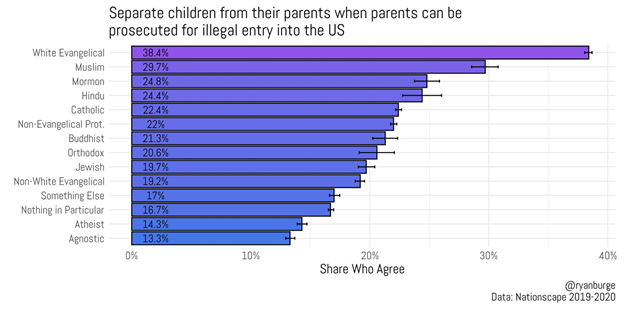
While powerful Christian organizations like World Vision condemn the Trump administration’s dramatic reductions in refugee caps, white Evangelicals were most likely to support reducing even legal immigration by 50 percent:
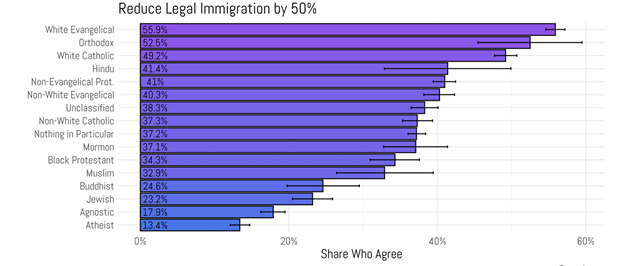
And if you think these attitudes are merely ancillary to American Evangelicals—side issues that shouldn’t distract from the main issue, abortion—then think again. In an August post, Burge found that “white evangelical Republican support for Donald Trump is based more on immigration policy than his view of abortion.” Both abortion and immigration mattered to Evangelicals. Immigration mattered more.
What is going on? Yes, there is some outright racism in the church. But we’re also seeing evidence of the Christian nationalism that has emerged more explicitly in the age of Trump, and Christian nationalism—because it is rooted so deeply in reverence for a particular version of the American story—will always minimize America’s historic sins and the present legacy (and reality) of American racism.
Christian nationalism will also always be alert to cultural change of all kinds (not just the sexual revolution), in part because “American culture” and “Christian culture” are experienced by all too many white Protestants as inseparable. You see signs of this in the conservative branding many of the more-religious sectors of American society (especially the rural and exurban centers of Republican power) as “real America” while huge swaths of American society, from its urban centers to its universities to many of its most successful corporations, are branded as less than fully authentic.
Moreover, in attitudes about the American founding, the American police, and the American military, you can see a defense of this nation and (some) of its institutions that runs deeper than in other American communities.
Again, it’s worth emphasizing that many white Evangelical political positions—on matters of immense importance to many millions of Americans—do not flow naturally from Evangelical biblical orthodoxy. There isn’t a straight line from scripture to severe immigration restrictions, for example, or from scripture to confidence in American police. Instead the political gaps between white Evangelicals and the rest of America flow from a series of historical, cultural, and ideological commitments that are contestable at best and unjust at worst.
Christians should defend religious liberty. They should defend life. But they should not even begin to presume that their ongoing “othering” in American society is a product of their virtue. Sometimes the world rejects Christians because it rejects Christ. Sometimes, however, the world rejects Christians because Christians are cruel. In that case, alienation isn’t persecution. It represents righteous judgment for our own political sin.
A Lila update …
I can’t tell you how grateful I am for the outpouring of love and prayers for our precious granddaughter.
Lila was born on Tuesday morning at Vanderbilt Children’s Hospital (that’s why I didn’t write my mid-week newsletters!) As we knew from ultrasounds, she suffered from gastroschisis, a serious condition where her bowels develop outside her body, and she also had only one functioning kidney. Previous ultrasounds also indicated that Lila might suffer from extremely low birth weight. We did not know the extent of the damage to her bowels or whether the presence of two simultaneous and rare birth defects indicated that there was also a serious genetic abnormality.
The news since birth, however, has been good and hopeful beyond what we thought possible. She was taken away almost immediately after birth for bowel surgery, and they were able to successfully place all her bowels back in her body. The single kidney is working well and appears healthy. She doesn’t seem to have a serious genetic abnormality, and she rallied late in the pregnancy to gain a great deal of weight before birth. She weighed a (very surprising) 5 pounds 8 ounces!
She’s still in the NICU. She’s struggling with pain and hunger, and the next big step is to see when Camille can try to feed Lila, but I can’t tell you how much better Lila’s doing than we had reason to expect. We’re at the beginning of a hard road, but hope abounds!
Please keep Lila and her parents in your prayers. Please pray for Lila’s continued healing and for Camille and Jarrett’s patience and endurance. It’s a hard, hard thing to see your baby in distress.
One last thing …
Since this is the last French Press before Christmas, I had to include my favorite Christmas hymn. Here it is—a wonderful version of “O Holy Night.” Enjoy:


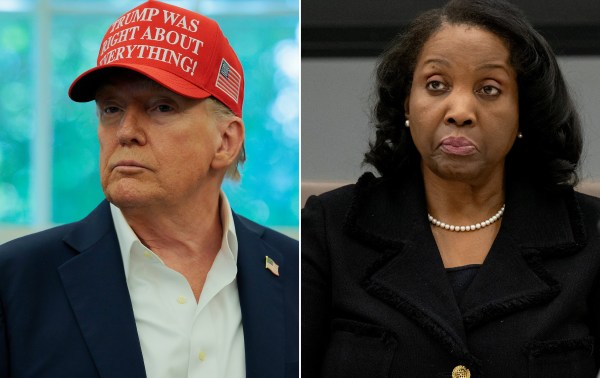




Please note that we at The Dispatch hold ourselves, our work, and our commenters to a higher standard than other places on the internet. We welcome comments that foster genuine debate or discussion—including comments critical of us or our work—but responses that include ad hominem attacks on fellow Dispatch members or are intended to stoke fear and anger may be moderated.
With your membership, you only have the ability to comment on The Morning Dispatch articles. Consider upgrading to join the conversation everywhere.